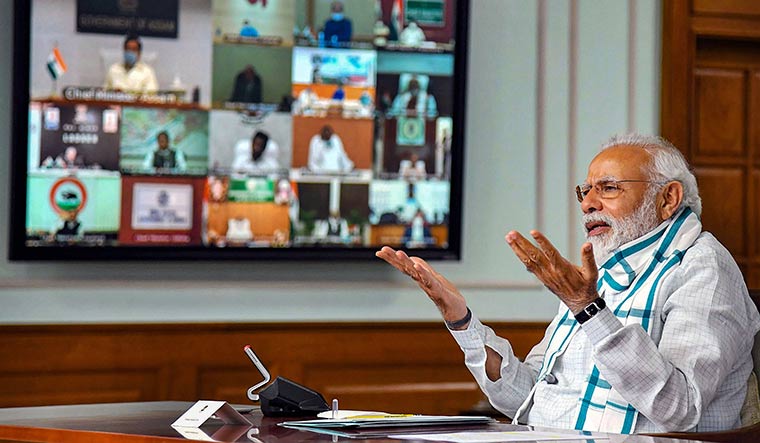Prime Minister Narendra Modi on Monday said reduction of transmission rate of the novel coronavirus and gradual increase in public activities while adhering to all guidelines are the two-fold challenges facing the country. Addressing chief ministers via video conference, the prime minister also said he is of the "firm view that the measures needed in the first phase of lockdown were not needed during the second phase and similarly the measures needed in the third phase are not needed in the fourth", according to an official statement.
The prime minister reaffirmed the importance of do gaz doori (a distance of two yards) and added that suggestion of "night curfew" raised by many chief ministers would surely reaffirm the feeling of caution among people. Referring to the resumption of train services, Modi said it was needed to rev up the economic activity. But, he made it clear that services on all routes will not be resumed and that only a limited number of trains would ply.
Nearly two months after it suspended operations of passenger trains over the coronavirus crisis, the railways will resume services with 15 pairs of trains on select routes from Tuesday.
Referring to the twin objectives, he said "We can now focus our strategy in this battle against coronavirus, as should be the case. We have a two-fold challenge—to reduce the transmission rate of the disease, and to increase public activity gradually, while adhering to all the guidelines. We will have to work towards achieving both these objectives."
As thousands of migrant workers reach their native states on board special trains, Modi also emphasised on the need to stop the spread of COVID-19 to rural areas. Rendered jobless due to lockdown, scores of migrant workers have started returning to their home states. About the concerns raised by several chief ministers during the lockdown period, Modi said suggestions made by the states for a "roadmap on economy" have been given "due consideration".
The prime minister asked the chief ministers to share by May 15 a broad strategy on how they want to deal with lockdown regime in their states. "I request you all to share with me by May 15 a broad strategy on how each one of you would want to deal with the lockdown regime in your particular states. I want states to make a blueprint on how to deal with various nuances during and after gradual easing of the lockdown," he said.
What did the chief ministers say?
The chief ministers, in their suggestions on reviving the economy sought support to micro, small and medium enterprises, infrastructure projects such as power, easing of interest rates on loans and assured market access to agricultural produce. Haryana Chief Minister Manohar Lal Khattar on Monday urged the Central government to authorise states to decide on their own to resume industrial and economic activities in green, orange, and red zones barring the containment ones. Expressing concern over the future of the youth, Khattar once again also urged the Central government to consider opening schools, colleges and educational institutions running professional courses with 50 percent limit to maintain social distancing norms.
West Bengal Chief Minister Mamata Banerjee Monday accused the Centre of "playing politics" over the COVID-19 outbreak and dubbed the nationwide lockdown a "poorly planned" exercise, PTI reported. She suggested that states be allowed to decide on which sectors to open and which to keep shut keeping in mind the situation on the ground. "On one hand the Centre wants the lockdown to be enforced strictly, and on the other it is resuming train services and reopening land borders. What is the point in continuing with the lockdown if the railways, land borders and all other sectors are allowed to reopen? This is contradictory."
Puducherry Chief Minister V. Narayanasamy claimed Prime Minister Narendra Modi was non- committal on fiscal assistance to states despite them apprising him of the fiscal sufferings during his video conference on Monday. Therefore, there was no other option for Puducherry except to borrow from the Reserve Bank of India to tide over the current fiscal crisis, he told reporters. Narayanasamy said he had brought to the Prime Minister's notice the fall in the revenue due to closure of all business establishments, liquor shops and industrial units since the COVID-19 lockdown began in March.
Compulsory quarantining highlighted
ALSO READ
- 335 fresh Covid cases in India
- From polio to Covid-19: What we can learn from polio eradication for pandemic response
- Sudha Murty praises Vivek Agnihotri's 'The Vaccine War'
- China won't require COVID-19 testing for incoming travellers starting Wednesday
- North Korea to allow its citizens abroad to return home, a sign of further easing of pandemic curbs
Compulsory quarantining of the stranded Indians returning from abroad by air and sea routes was also highlighted. PM Modi said, "We must understand that the world has fundamentally changed post COVID-19." "Now the world will be pre-corona, post-corona just like the case of the world wars. And this would entail significant changes in how we function," the PM was quoted as saying in the statement. Modi pointed out that the new way of life would be on the principle of "Jan se lekar jag tak" (from an individual to the whole of humanity). "We must all plan for the new reality," he said.
-Inputs from PTI


